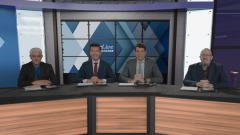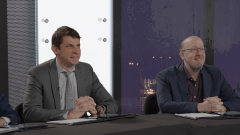
Patient Profile 1: A 74-Year-Old Man Diagnosed With Mantle Cell Lymphoma
A patient profile of a 74-year-old man diagnosed with mantle cell lymphoma who receives treatment with a non-covalent BTK inhibitor is presented by Alexey V. Danilov, MD, PhD.
Episodes in this series

Transcript:
Alexey V. Danilov, MD, PhD: This is a 74-year-old man who presents with night sweats, fatigue, and weight loss of 15 pounds in 6 months. His concurrent medical problems include COPD [chronic obstructive pulmonary disease], and he’s an ex-smoker of 40 pack-years. PET [positron emission tomography]–CT shows diffuse lymphadenopathy within the neck, chest, abdomen, and pelvis, and increased hypermetabolic activity within the spleen, with an SUV [standardized uptake value] around 12 in all these regions. Lymph node biopsy demonstrates a diagnosis of mantle cell lymphoma, CD5/CD19/CD20 positive, cyclin D1 positive. Ki67 was 10% to 20%, and it’s also SOX11 positive. Bone marrow biopsy is involved by mantle cell lymphoma but blood counts are normal.
This patient undergoes bendamustine-rituximab [BR] therapy and achieves complete response. Subsequently, surveillance PET-CT a few months later demonstrates an increase in the size and number of mesenteric lymph nodes again, with an SUV of 12. That’s within the year of starting therapy. He starts on [the BTK inhibitor] ibrutinib, and achieves complete response by PET quickly. However, this therapy is complicated by atrial fibrillation. He had to start apixaban. He also had recurrent bronchitis, for which he had to take multiple courses of antibiotics and [had] chronic coughs. Ibrutinib dose was decreased to 280 mg daily over time.
This is a patient who was 74 at the time of diagnosis, rapidly progressed through BR, and is progressing after ibrutinib therapy after about 2 years. When he comes to the clinic, he has fever, he’s febrile up to 101[° F]. He has rapid weight loss, night sweats—again, [he’s] only 2 years on ibrutinib—diffuse lymphadenopathy, [and the] SUV this time is about 18. Echocardiogram shows ejection fraction of 40%. He also has circulating MCL cells with anemia. How would you treat this patient? Matt, what would you do?
Matthew J. Matasar, MD: You present a challenging case, and it’s one that’s not foreign to us in our clinical practices. We know that we have good outcomes in many patients with first-line therapies, whether receiving intensive treatments as you described earlier or less intensive treatments such as bendamustine-rituximab. Outcomes with second-line BTK inhibition are often quite good and patients can enjoy durable disease control and meaningful response to these treatments, but there’s a subset of patients, as yours was, unfortunately, who have inferior outcomes with these standard approaches. The first thing that we would always say…at academic institutions [is that] this is a good candidate for clinical trial. That’s true because we don’t have a single standard of care for these patients. [Although] we have meaningful tools [available], I do think that there’s room for us to continue to improve in this space.
In terms of off-the-shelf, what would I offer this patient in my clinic today? It’s hard to know exactly the patient’s performance status and the degree of their comorbidity with a presentation such as this, but I would want to explore their candidacy for chimeric antigen receptor–modified T-cells such as brexucabtagene. That would be my preferred approach if I thought that he was able to receive it in terms of his comorbidities, his fitness, and the support system around him to see him through such treatment.
Alexey V. Danilov, MD, PhD: Excellent. Thank you, Matt. He was progressing rapidly, and he received a couple of doses of CD20 antibodies and was able to go onto pirtobrutinib therapy, and he’s currently doing well.
Transcript edited for clarity.





































